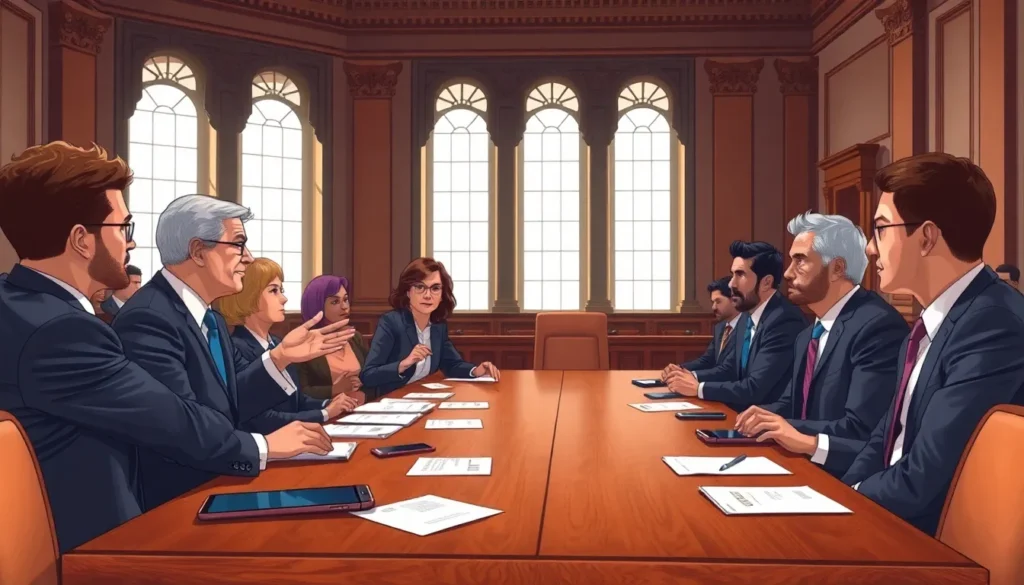In a world where decisions shape lives, jobs in public policy stand at the intersection of power and purpose. Imagine being the mastermind behind policies that can transform communities, boost economies, or even save the planet. Sounds enticing, right? It’s not just about drafting laws or attending endless meetings; it’s about making a real difference while flexing those critical thinking muscles.
Whether it’s tackling climate change or improving healthcare access, public policy professionals are the unsung heroes working behind the scenes. With a combination of analytical skills and a dash of creativity, they navigate the complex web of government and society. So if you’re ready to swap your desk job for a chance to influence change, buckle up! The world of public policy awaits, and it’s more exciting than a cat video going viral.
Table of Contents
ToggleOverview of Jobs in Public Policy
Jobs in public policy encompass a range of roles that directly influence government actions and societal outcomes. Analysts conduct research to assess the effectiveness of policies, providing recommendations based on data-driven insights. Lobbyists advocate for specific causes, working with lawmakers to shape legislation that aligns with their interests.
Researchers evaluate social issues, generating evidence that informs policy development and implementation. Policy advisors help government officials navigate complex decisions, ensuring that their strategies align with public needs and values. Many professionals collaborate across sectors, bridging gaps between government, non-profits, and the private sector.
Roles in public policy typically require a blend of skills, including analytical thinking, communication, and negotiation. Many positions demand an understanding of legal frameworks and regulatory processes.
Educational backgrounds for these jobs vary, often including degrees in political science, economics, or public administration. Graduate programs enhance prospects, providing deeper insights into policy analysis and ethical governance. Career paths often lead to positions in government agencies, think tanks, and international organizations.
Salaries in public policy differ based on experience, location, and specific roles. Entry-level positions may start around $40,000, while senior roles can exceed $100,000, especially in metropolitan areas. Passion for public service drives many individuals toward this field, creating opportunities to enact meaningful change.
Networking plays a crucial role in securing jobs in public policy. Joining professional associations and attending industry conferences helps build connections that can lead to job opportunities. Staying informed about current policy debates enhances marketability in this competitive landscape.
Types of Jobs in Public Policy

Public policy offers a diverse range of career paths that influence governmental decisions and societal progress. Opportunities exist across sectors, reflecting the multifaceted nature of this field.
Government Positions
Government positions encompass various roles, including policy analysts, legislative aides, and program managers. Policy analysts assess data to provide evidence-based recommendations. Legislative aides support elected officials by researching legislation and drafting policies. Program managers oversee the implementation of government initiatives, ensuring compliance and effectiveness.
Nonprofit and Advocacy Roles
Nonprofit and advocacy roles focus on championing social causes and promoting community welfare. Advocacy directors lead campaigns to influence policy change on issues such as healthcare and education. Research associates gather data to support advocacy efforts, creating compelling narratives for stakeholders. Grant writers develop proposals to secure funding for programs aimed at addressing critical community challenges.
Private Sector Opportunities
Private sector opportunities include positions like corporate social responsibility (CSR) managers and lobbyists. CSR managers implement strategies that align business goals with societal needs. Lobbyists engage with policymakers to advocate for corporate interests while navigating complex regulatory environments. Consulting firms also offer roles for policy consultants who provide guidance to businesses on governmental regulations and compliance.
Required Skills and Qualifications
Careers in public policy demand a combination of education and skills to effectively navigate complex issues. Professionals often excel with the right training and competencies, which enhance their ability to influence decision-making processes.
Educational Background
A bachelor’s degree in fields such as political science, economics, or public administration serves as a foundational requirement for many public policy roles. Advanced degrees, like master’s or PhDs, significantly improve job prospects and opportunities for specialized positions. Relevant coursework frequently includes public policy analysis, research methods, and statistics. Internships during academic experiences are also beneficial, providing practical skills and networking opportunities crucial for entering the job market.
Essential Skill Sets
Analytical thinking remains a core competency for public policy roles, enabling professionals to evaluate data and assess implications. Communication skills also play a vital role, as clear articulation of ideas to diverse audiences is crucial. Negotiation abilities facilitate productive discussions among stakeholders, especially in contentious issues. Familiarity with legal frameworks and regulatory processes enhances one’s effectiveness in navigating various governmental structures. Additionally, adaptability and creativity often contribute to problem-solving in rapidly changing environments.
Job Market Trends
The job market for public policy professionals remains robust and dynamic. Growth in governmental, nonprofit, and private sector roles signals increasing opportunities. Positions such as policy analysts, legislative aides, and program managers frequently appear in government listings, demonstrating sustained demand. Nonprofits emphasize hiring for roles focused on social advocacy and community development, reflecting a strong commitment to societal welfare.
Specific statistics indicate an upward trend in job availability. According to the Bureau of Labor Statistics, employment for political scientists, including public policy careers, is projected to grow by 6% from 2021 to 2031. Urban centers often feature higher salary ranges due to the concentration of policy-related positions. Entry-level salaries typically start around $40,000, while experienced professionals can earn upwards of $100,000.
Networking remains essential in this field. Industry conferences and professional associations provide avenues for building relationships and securing valuable connections. Research suggests that nearly 70% of job openings are never advertised, highlighting the importance of internal referrals. Individuals engaged in public policy often cite a desire for impactful work as a key motivator in choosing their careers.
Familiarity with emerging issues shapes hiring decisions as well. Knowledge of current events, particularly in areas like climate change and healthcare, enhances a candidate’s attractiveness. Employers prioritize candidates who display strong analytical skills, effective communication, and adaptability in navigating evolving challenges. Increasingly, familiarity with digital tools and data analysis techniques becomes essential, adding another layer to the qualifications sought by hiring managers.
Understanding these trends helps candidates position themselves effectively in the competitive public policy landscape. Keeping abreast of industry developments and skill requirements ensures readiness for the opportunities ahead.
Careers in public policy offer individuals a unique chance to influence society and drive change. With a diverse range of roles available across various sectors, professionals can find their niche based on their skills and passions. The growing demand for public policy experts underscores the importance of staying informed and adaptable in this ever-evolving field.
Networking remains a key component for success, as many opportunities arise through connections rather than traditional job postings. As public policy continues to address critical issues like climate change and healthcare, those who enter this field can expect a rewarding career that not only fulfills personal ambitions but also contributes to the greater good.



